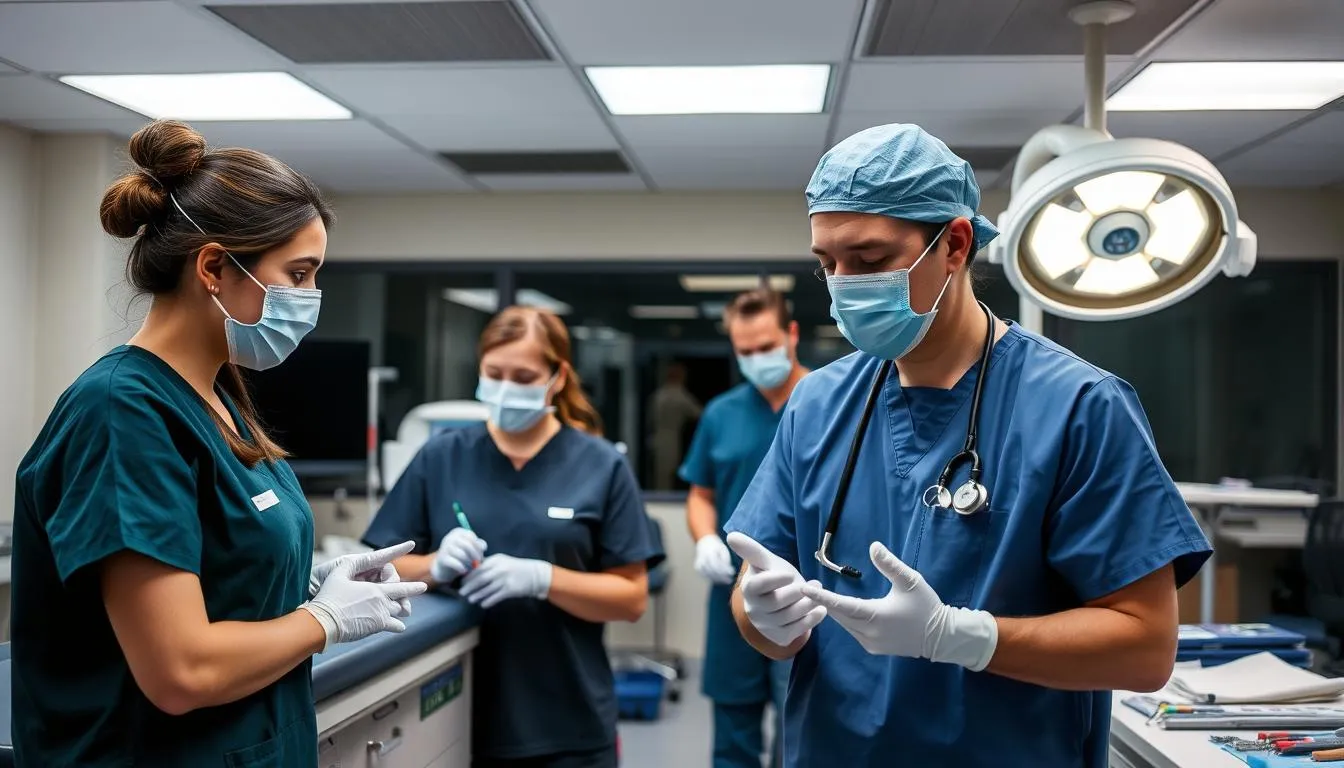Surgical techs play a vital role in operating rooms. They assist surgeons and nurses during surgical procedures.
Becoming a surgical tech is a rewarding healthcare career path. Let’s explore the steps to become a certified surgical tech.
A focused surgical technologist in a modern training classroom, wearing scrubs and gloves, surrounded by surgical instruments and a simulation operating table, practices sterile techniques with an attentive instructor guiding them, bright overhead lights illuminating the scene.
Surgical techs are crucial members of the surgical team. They ensure the operating room is ready for procedures.
Understanding the steps to becoming a surgical tech can help you decide if this career is right for you.
Understanding the Role of a Surgical Technologist
Surgical technologists are vital in operating rooms. They ensure smooth and efficient surgical procedures.
These pros have many duties. They maintain sterile fields and prepare surgical equipment.
Keeping the sterile field clean is key. They arrange the room and sterilize tools carefully.
Surgical techs prepare and organize equipment, too. They stock instruments, sutures, and supplies for easy access.
This lets surgeons focus on complex tasks. The tech ensures everything is ready.
During surgery, techs work closely with the team. They hand tools to surgeons when needed.
Teamwork is crucial in the operating room. Good communication helps operations succeed.
Educational Pathways to Surgical Tech Certification
Surgical technologists have many educational paths to choose from. Each option has its benefits.
Certificate and diploma programs take about a year to finish. They focus on key skills for surgical techs.
These programs are often offered at vocational schools or community colleges. They are good for quick entry into the field.
Associate degree programs last about two years. They offer a wider range of courses.
These programs include general education and surgical tech training. Community colleges and technical schools often offer them.
Choose a program accredited by CAAHEP or ABHES. This ensures high-quality education.
Accredited accredited surgical technology programs prepare you for the CST exam. This exam is key for certification.
Understanding these options helps future surgical techs make good choices. It leads to a rewarding healthcare career.
Length of Training Programs
Surgical technologist training programs vary in length. The time needed depends on your chosen educational path.
Certificate programs usually take 9-15 months to complete. They focus on preparing students for the CST exam.
Diploma programs last 12-18 months. They offer a deeper look into the surgical tech field.
Associate degree programs typically last 18-24 months and include general education courses and surgical tech training.
Some schools offer accelerated programs lasting 12-15 months. These are for students ready for fast-paced learning.
Part-time options are available, too. They help balance work, family, and education needs.
Your training length depends on your goals and schedule. Understanding program options helps you choose the best path.
Certification Options for Surgical Technologists
Surgical technologists can choose between two main certification options: the Certified Surgical Technologist (CST) and Tech in Surgery-Certified (TS-C) credentials.
The National Board of Surgical Technology and Surgical Assisting awards the CST certification. It’s widely recognized as the gold standard for surgical technologists.
To become CST certified, you must complete an accredited program and pass a written exam on various topics.
CSTs must maintain their certification through continuing education and periodically take recertification exams.
The National Center for Competency Testing offers the TS-C certification, which technologists working in specialty surgical settings often prefer.
The TS-C exam focuses on advanced surgical techniques and tests knowledge specific to the technologist’s area of practice.
TS-C-certified technologists must also maintain their certification through ongoing learning.
A proud surgical technologist in scrubs and surgical mask, standing confidently in a bright operating room, surrounded by medical instruments and equipment, showcasing a sense of professionalism and expertise. The sterile environment reflects the dedication to patient safety and surgical excellence.
Some states may require surgical technologists to get state-specific licensure or registration. These requirements can vary by location.
Aspiring surgical technologists should check the licensure requirements in their state. This will help them prepare for their future career.
Continuing Education and Professional Development
Surgical technologists must keep learning to stay up-to-date. Surgical tech CEUs are vital for maintaining certification and keeping up with healthcare changes.
Advanced certifications in specialized areas, such as robotics, cardiovascular surgery, and neurosurgery, can boost career opportunities.
Joining the Association of Surgical Technologists (AST) offers valuable networking and resources. AST provides specialized training, conferences, and advocacy initiatives for career growth.
Continuing education is crucial for expanding skills and staying competitive. It helps surgical technologists position themselves for long-term success.
By embracing lifelong learning, surgical techs can advance their careers. This commitment ensures they remain at the forefront of their field.

Job Outlook and Career Advancement
Surgical technologists have a bright future. The field is growing fast, with a 9% increase expected from 2021 to 2031.
This growth comes from an aging population. It also stems from more complex medical procedures and healthcare expansion.
The field offers many career growth opportunities. Some techs become surgical first assistants, helping surgeons with complex procedures.
Others move into healthcare management roles. They use their skills to oversee surgical departments or healthcare facilities.
Surgical technologists can earn well, too. The median yearly wage is about $50,580 as of 2021.
Top earners can make over $70,000 yearly. This is possible in high-paying industries or with special certifications.
Surgical technology offers great job prospects. It’s a rewarding career choice in healthcare with room for growth.
Financial Considerations of Becoming a Surgical Tech
Becoming a surgical technologist requires careful financial planning. Program costs vary, but community colleges are often more affordable than four-year schools.
Certification exams, textbooks, and equipment add to the overall expenses. These extra costs should be factored into your budget.
Financial aid can help offset surgical tech program costs. Scholarships, grants, and loans make this healthcare career more accessible.
Research and apply for financial aid to reduce your financial burden. This can make becoming a surgical tech more achievable.
The initial investment may seem high, but the career offers good returns. Surgical technologists earn competitive salaries and have strong job prospects.
Weigh the costs and benefits carefully. This will help you make an informed decision about this rewarding career.
Conclusion: Assessing Your Path to Becoming a Surgical Tech
Is a surgical tech career right for you? Think about your goals and strengths.
Surgical techs need to care for patients and pay attention to details. They must also keep learning and growing in their field.
Do you love medicine and work well under pressure? Surgical techs have a big impact on patient care.
Can you use your hands to solve problems? You’ll need to be able to work well with many types of people.
If this job interests you, look into schools and training programs. Also, talk to surgical techs and healthcare workers about their jobs.
With hard work, you can start an exciting career as a surgical tech.
FAQ
How long does it typically take to become a surgical technologist?
Most surgical technologist programs take 9 months to 2 years. Certificate programs are shorter, while associate degree programs take longer.
What kind of educational program do I need to become a surgical technologist?
You can get a certificate, diploma, or associate degree. Choose a program accredited by CAAHEP or ABHES.
What are the key responsibilities of a surgical technologist?
Surgical technologists keep the operating room sterile. They prepare tools and help the surgical team during procedures.
They work with surgeons, nurses, and other healthcare professionals. Their goal is to ensure successful operations.
What certifications are available for surgical technologists?
The main certifications are Certified Surgical Technologist (CST) and Tech in Surgery-Certified (TS-C). Both require passing an exam.
Some states have special rules for surgical technologists. Check your state’s requirements.
What are the career advancement opportunities for surgical technologists?
Surgical technologists can become surgical first assistants or healthcare managers. They can also focus on areas like robotics or heart surgery.
Continuing education helps you move up in this field. Keep learning to grow your career.
What is the job outlook for surgical technologists?
The job outlook for surgical technologists is good. More jobs are expected due to increased demand for surgeries.
How much do surgical technologists typically earn?
Surgical technologists in the U.S. earn about $50,000 per year. Pay varies based on location, experience, and special skills.
You may also read : Geekzilla Tech: Your Ultimate Guide to Tech Reviews
